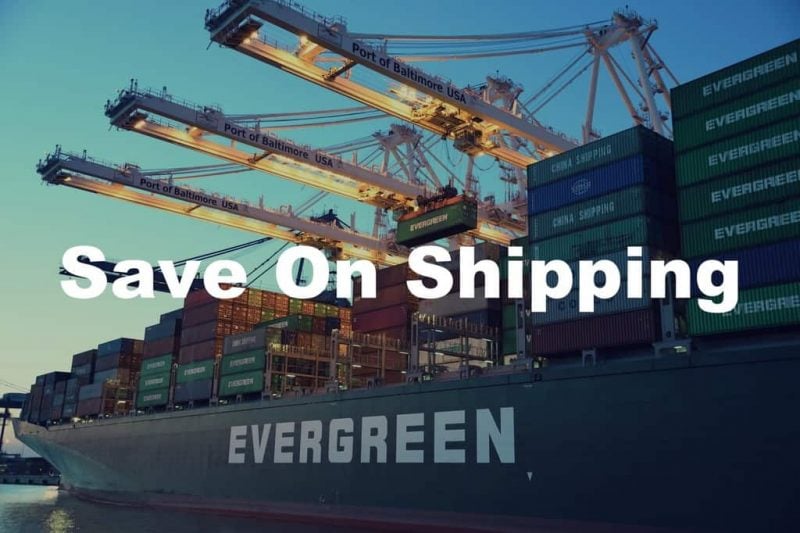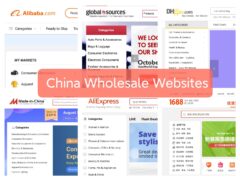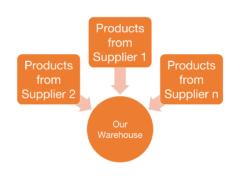One of the many frequently asked questions from our customers is: Can I send my products to you from different suppliers and you will combine them in one shipment and send to me so I can save on shipping cost?
The answer is absolutely a YES.
However, today I’m going more in depth so that if you’re Googling something like how to save money shipping from China, how to combine my products from different suppliers and send them in one shipment etc., you are at the right place to know more about it.
And in today’s post, I’m going to explain as many details as possible in the chapters below:
- What are the most commonly used international shipping methods?
- What’s the best method for you?
- How to find a reliable sourcing agent or shipping agent that best suits your needs.
Now without further ado, let’s dive right in.
Chapter 1: What are the most commonly used international shipping methods?
In short, there are mainly 4 methods:
- By Sea
- By Air
- By Express
- By Land / Ground Transport
And a comparison is listed in the chart below:
| Shipping | Best for | Pros | Cons |
| By Sea | 1, Not urgent products 2, Bulky products 3, Large items 4, Heavy items | Cheap and global reach | 1, Slow 2, Complicated process |
| By Air | 1, High value products 2, Urgent products 3, Small commodities | Fast and global reach | Expensive |
| By Express | 1, High value products 2, Urgent products 3, Small commodities | Fast and global reach | Expensive |
| By Land | 1, Large items 2, Countries connected by land 3, Heavy items | Cheap and convenient for some countries only | 1, Not for countries not directly connected by land 2, Slower compared to shipping by air but usually faster than by sea. |
With the chart, you should have a general understanding of international shipping and which is best for what products.
Chapter 2: What’s the best method for you?
When you think about how to ship your products from China to your country, I think it’s best practice to leave yourself as much time as you possibly can so that you can potentially save on international shipping cost.
Let’s say you want to import some bags from China and you need them very urgently then you will be lest of no options but to send them by air or by express. But if you are planning for a few months from now to receive the products then you can put all these products in a container and ship them by sea, which will save you a ton of money on shipping.
I think we can split the discussion in several scenarios so that we can dig into each and every case and see what is best for each.
There are some industries where you mainly use sea shipping, e.g. furniture and large machinery. These are large products that sea shipping is most favored, whether it’s a sample or bulk order. The reason is quite self-explanatory, they are large. But in many cases, you’ll have to choose as per the actual condition.
Sending samples
If you are buying small commodities like shoes, bags, stationary, toys, clothing and many other stuffs, and you need to buy a few pieces for sampling purposes. In this case, it’s best to ship by express like DHL, FedEx, UPS, TNT, Aramex etc. Depending on where you are, choose one that offers the best rates as their speeds are more or less the same. In some regions one may be faster and more reliable and in other areas, another express company may be faster and cheaper.
The reason why shipping by sea is not recommended is that shipping by sea is usually charged per bill and per CBM, meaning even if you send a few pieces of clothes, you will go through the same customs process as when you send a full container of goods. You’ll need to pay for customs clearance fees, agent fees, sea freight etc. (The fee may be included in the service see or in a separate form depending on how you dealt with your supplier and agents). This is not a wise choice whatsoever.
Sending bulk goods
When it comes to shipping your bulk order, you want to really think about it and carefully evaluate it.
If you have a full container of goods and are OK with the time it takes to collect the goods at your destination, go by sea freight. This is widely used for small and big businesses.
If you have less than a full container of goods, you can also ship by sea, commonly known as LCL (Less than Container Load). In practice, the container will be shared by products from different customers. However, this won’t necessarily save you much cost as 1) you also need to pay the customs fees and 2) the price per CBM is not the total cost divided by the actual CBMs of a container, but usually higher than that. That’s why in practice, sometimes you find it cheaper to order a full container than if you order say, 20 CBMs. And that explains why sending full containers of goods is the most cost-effective way of international shipping.
Well, it’s also common for someone who just started their business and only ordered a small quantity of goods for testing the market. This is understandable and good practice as well.
Say if you only have a few cartons of goods to ship, it’s best to get a quote for shipping by air, express and by sea. Because in this case, sending by express or air may be only a little higher cost than shipping by sea, but that may save you maybe 1 week time. In this case, you’ll want to evaluate if you prefer to get the goods earlier so you can sell them earlier and potentially get to know the market needs sooner by air freight, or if you prefer to save on shipping cost and are OK with waiting for one more week.
This is just an example of how you can balance time and money in your case.
Chapter 3: How to find a reliable sourcing agent or shipping agent that best suits your needs.
Since international trading is a complex process, there are usually agents involved in the whole process, both from the supply end and the receiving end.
For Chinese suppliers to export the goods they produce, they need to have export right. But actually, a large number of manufacturers and factories don’t have that, especially small factories. So, in this case, they need to use a shipping agent or shipping forwarder who can provide support in the exporting process, including contacting customs clearance agencies, pick up the goods from suppliers, booking containers or seats and arrange international shipping etc., the whole process of which can be overwhelming for a factory if they have to do every part of it. That’s why each party has chosen to do what they are best at and partner with each other.
For buyers who don’t have import rights / import license, they can also use a local agent to help in the process of importing goods.
Now, what if you just started and you want to buy from different suppliers so you can compare and see which is the one for you? You don’t want them to know each other and you can’t ask each of them to send the goods to you by DHL, which will cost you too much.
That’s when and why you may consider hiring someone who can coordinate the situation for you, someone in China who can collect these products from different suppliers and put them in one shipment and send it to you. This will save you money for sure.
You can ask your friend who lives in China and also knows the trading process for help, if you have. Or, you can find a sourcing agent or shipping agent in China who can do this task for you.
I would recommend you to find a sourcing agent for the best value.
A sourcing agent can not only collect the goods and arrange shipment for you, but they usually also source products, carry out QC check, monitor the production process, at a service fee agreed between you and them, based on commission, or time or project. This really depends on how you expect to work with them and everything is negotiable.
If you choose a shipping agent, they usually have no problem collecting the goods by asking suppliers to send them to their warehouse. But their service is quite limited to this part. They usually do not offer services like sourcing products, QC, production monitor etc. And if you work with a shipping agent, you’d also need to provide information about the products and suppliers as you would to the sourcing agent. So, you’ll end up spending more time on this matter.
But how do you find an agent you can count on?
Well, unfortunately no magic. Trial and error.
You can find a long list of sourcing agents by a quick search on Google and most of them claim to offer such services.
The most important part is: reach out to them and talk with them and see who you feel comfortable with. Some respond fast, some do not; some welcome large clients only while others promote serving small customers and growing all the way with them.
The service fee is quite transparent nowadays and you need to evaluate not only the financial part, but also their willingness to work with you, which is crucially important, as this will save you a lot of hassle in the future.
Then you’ll start to test cooperation with a small order. By going through a whole process, you should have a better idea of your agent and the whole import experience.
If you find it smooth in the whole process, you probably want to stick to the same agent and work with them for more projects; if not, you should try working with another agent. Don’t put all your eggs in one basket.
Now I’d like to hear your thoughts.
Do you choose to work with a sourcing agent or a shipping agent?
Do you have a clear idea of how to move forward on this import from China business?
Either way, let me know by leaving a comment below right now.








